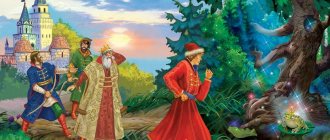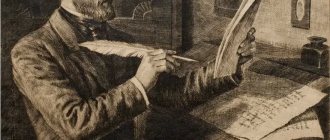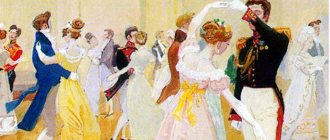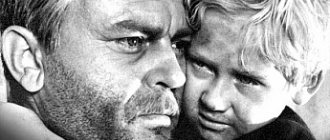| Sleeping princess | |
| Fairy tale cover. Artist V.N. Kurdyumov | |
| Genre | Russian literary fairy tale in verse |
| Author | Vasily Andreevich Zhukovsky |
| Original language | Russian |
| Date of writing | 1831 |
| Date of first publication | 1832 |
| Text of the work on Wikisource | |
| Media files on Wikimedia Commons |
Painting by V. Vasnetsov “The Sleeping Princess”
“The Sleeping Princess”
- a fairy tale by V. A. Zhukovsky, written August 26 - September 12, 1831 in Tsarskoye Selo[1]. It is an independent literary work of authorship, based on the plot of the German folk tale “The Briar Princess” (German: Dornröschen), which he found from the Brothers Grimm, and the French “The Beauty Sleeping in the Forest” (French: La Belle au Bois Dormant), processed by Charles Perrault. The fairy tale was first published in the magazine “European”, 1832, No. 1, January, pp. 24-37, under the title “The Tale of the Sleeping Princess.”
History of creation
Zhukovsky and Pushkin spent the summer of 1831 in Tsarskoe Selo. There they entered into a kind of dispute: who would better write a fairy tale, reminiscent of a Russian folk tale in style. Gogol, who was with them, recalled this side of the life of the two poets: “I lived all summer in Pavlovskoye and Tsarskoe Selo... We gathered almost every evening - Zhukovsky, Pushkin and I. How many delights have come from the pens of these men! Pushkin has... Russian folk tales... Zhukovsky also has Russian folk tales... Wonderful thing! Zhukovsky cannot be recognized”[2].
That year Zhukovsky created “The Tale of Tsar Berendey” and “The Sleeping Princess”, Pushkin - “The Tale of Tsar Saltan”.
Literature. Grade 5 (Part 1) The Sleeping Princess
| Sleeping princess Once upon a time there lived a good Tsar Matvey; He lived in harmony with his queen for many years; But the children are still gone. Once the queen was in the meadow, On the green bank of the stream she was alone; She cried bitterly. Suddenly, she looks, a cancer is crawling towards her; He said to the queen like this: “I feel sorry for you, queen; But forget your sadness; You will bear this night: You will have a daughter.” - “Thank you, good cancer; I wasn’t expecting you at all...” But the cancer crawled into the stream, without hearing her speeches. 1. What he said came true on time: the queen gave birth to a daughter. The daughter was so beautiful that no fairy tale could tell, no pen could describe. Here is a noble feast given by Tsar Matthew to the whole world; And to the merry feast that King eleven calls the young Sorceresses; There were all twelve of them; But the twelfth one, Lame-legged, old, angry, the Tsar did not invite to the holiday. Why did Our reasonable Tsar Matvey make such a mistake? It was offensive to her. Yes, but there is a reason here: The king had twelve dishes, It was in the royal storerooms; Lunch was prepared; But there is no twelfth (Who stole it, It is not given to know about it). “What should we do here? - the king said. “So be it!” And He did not send the old woman to the feast. The guests, invited by the king, gathered to feast; They drank, ate, and then, thanking the hospitable king for the reception, they began to give his daughter: “You will walk in gold; You will be a miracle of beauty; You will be to the joy of everyone, well-behaved and quiet; I will give you a handsome groom. Your life will pass in jest among friends and relatives...” In a word, ten young Sorceresses, having given the gift of the child in a vying manner, walked away; in its turn And the last one goes; But she didn’t even have time to say a word - lo and behold! And the uninvited woman stands above the princess and grumbles: “I wasn’t at the feast, But I brought a gift: In your sixteenth year you will meet with trouble; At this age, you will scratch your hand with a spindle, my light, and die in the prime of your life!” The witch disappeared from sight; But the Speech that remained there said: “I will not allow her to swear at my princess without a way; It will not be death, but sleep; It will last three hundred years; The appointed time will pass, And the princess will come to life; He will live in the world for a long time; The grandchildren will cheer their mother and father with her until their earthly end.” The guest disappeared. The king is sad; He doesn’t eat, doesn’t drink, doesn’t sleep: How can you save your daughter from death? And, in order to ward off trouble, He gives the following decree: “It is forbidden for us to spin or twist, so that there are no spindles of the Spirit in the houses; So that everyone can be sent out of the kingdom as soon as possible.” The king, having issued such a law, began to drink, and eat, and sleep, and began to live and live, as before, without worries. Days pass; daughter is growing up; Bloomed like a May flower; Now she’s fifteen years old... Something, something will happen to her! Once the Tsar went for a walk with his queen; But it didn’t happen to them to take the princess with them; She suddenly got bored alone, sitting in a stuffy room and looking out the window at the light. “Let me,” she finally said, “I’ll look around our palace.” She walked through the palace: There are no number of magnificent rooms; She admires everything; Here, he looks, the door to peace is open: in that peace the staircase winds like a screw around the pillar; up the steps He goes up and sees the Old Woman sitting there; The ridge under the nose sticks out; The old woman is spinning and singing behind the yarn: “Spindle, don’t be lazy; The yarn is thin, do not tear; Soon the Guest awaiting us will arrive in good time.” The awaited guest entered; The spinner silently gave it, took it, and instantly it "The Sleeping Princess" Hood. V. Kutlinsky It pricked her hand... Everything disappeared from her eyes; A dream comes over her; Together with her he embraces the entire huge royal house; Everything calmed down; Returning to the palace, on the porch her father staggered and yawned, and fell asleep with the queen; The whole retinue is sleeping behind them; The royal guard stands under arms in deep sleep, and the cornet himself sleeps on a sleeping horse in front of her; Motionless along the walls The dogs sleep at the gate; In the stalls, with their heads bowed, their lush manes hanging down, the horses do not eat the feed, the horses sleep in a deep sleep; The cook sleeps in front of the fire; And the fire, engulfed in sleep, does not burn, does not burn, stands like a sleepy flame; And the sleepy smoke, curled up in a cloud, will not touch him; And the surrounding area with the palace is all enveloped in a dead sleep; And the surrounding area was covered with forest; A fence made of thorns surrounded the wild forest; He forever blocked the path to the royal house: For a long, long time it will not be found - And trouble will approach! A bird will not fly there, an animal will not run close, even the clouds of heaven will not blow a breeze onto the dense, dark forest. A full century has already passed; As if Tsar Matvey had never lived - So He was erased from the memory of people long ago; They only knew one thing, That the house stood in the middle of the forest, That the princess was sleeping in the house, That she would sleep for three hundred years, That now there was no trace of her. There were many daredevils (According to the legend of the old men), They went into the forest to wake up the princess; And they walked, but no one came back. Since then, in the impregnable, terrible forest, neither the old nor the young has set foot behind the princess. Time kept flowing and flowing; Three hundred years have passed. What happened? One spring day, the king's son, amusing himself with fishing, rode through the valleys and fields with a retinue of hunters. He fell behind his retinue; And suddenly the king’s son found himself alone near the forest. Bor, he sees, is dark and wild. An old man meets him. He spoke to the old man: “Tell me about this forest.” Shaking his head, the old man told everything that he had heard from his grandfathers about that wonderful forest: How the rich royal house stood in it a long time ago, How the princess sleeps in the house, How wonderful it is a dream, How it lasts for three centuries, How in a dream the princess waits, That the savior will come to her; How dangerous the paths into the forest were, How the youth tried to reach the princess, How the same thing happened to everyone: they ended up in the forest, and died there. There was a daring fellow, the Tsar's son; from that fairy tale he squeezed Spur into a horse; The horse pulled back from the sharp spurs and rushed like an arrow into the forest, and in an instant there. What appeared to the eyes of the King's Son? The fence that enclosed the dark forest was not thick with thorns, but a young bush; The roses are shining through the bushes; Before the knight he himself made way as if alive; My knight enters the forest: Everything is fresh and red before him; Moths dance and glitter on the young flowers; Streams wind like a bright snake, foam, gurgle; Birds jump and make noise. The forest is fragrant, cool, quiet, and nothing is scary in it. He travels along a smooth path for an hour or two; Finally, there is a palace in front of him; The building is a miracle of antiquity; The gates are open; He drives through the gate; In the courtyard he meets a Darkness of people, and everyone is sleeping: He sits rooted to the spot; He walks without moving; He stands with his mouth open, The conversation stopped with sleep, And since then the unfinished speech has been silent in his lips; He, having taken a nap, once got ready to lie down, but did not have time: A magical dream took over And, motionless for three centuries, He does not stand, does not lie And, ready to fall, sleeps. The Tsar's son was amazed and amazed. He walks between the sleepy ones to the palace; Approaches the porch; He wants to go up the wide steps; but there the king lies on the steps and sleeps with the queen. The way up is blocked. "How to be? - he thought. “Where can I get into the palace?” But he finally decided, And, having made a prayer, He stepped through the king. He goes around the entire palace; Everything is magnificent, but there is sleep everywhere, Suddenly he looks: the door to peace is open; in peace the staircase winds like a screw around the pillar; He ascended the steps. So what's there? His whole soul is boiling, The princess is sleeping in front of him. Like a child she lies, flushed with sleep; Her cheeks are young; The sleepy flame of the eyes shines between the eyelashes; The dark nights are darker, Braided curls with a black stripe Wrapped around the brow; The chest is white like fresh snow; A light sundress is thrown onto the airy, thin figure; White hands lie on trembling breasts; Squeezed in light boots. Legs are a miracle of beauty. The sight of such beauty is foggy, inflamed, he looks motionless; She sleeps motionless. What will destroy the power of sleep? In order to quench the Greed of his fiery eyes, at least a little, He knelt down and approached her with his face: The cheeks of those who were blushing hotly, And the breath of his lips was drenched, He could not restrain his soul and kissed her. And behind her, instantly from sleep, everything rose up: the Tsar, the queen, the royal house; Again talking, shouting, fussing; Not long ago, the whole region was immersed in sleep. The king goes up the stairs; Having had a walk, he leads the whole retinue in a crowd behind him; The guards are knocking with their guns; Flies fly in flocks; The love spell dog barks; The good horse finishes eating; The cook blows on the fire, And, crackling, the fire burns, And the smoke runs in a stream; - one Unprecedented royal son. He and the princess finally Descend from above; mother, father began to hug them. A wedding, a feast, and I was there And drank wine at the wedding; The wine ran down my mustache, but not a drop got into my mouth. "The Sleeping Princess" Zhukovsky and Pushkin spent the summer of 1831 in Tsarskoe Selo. There they entered into a kind of “competition”: who would better write a fairy tale similar to a folk one. Gogol, who was with them, recalled this side of the life of the two poets: “I lived all summer in Pavlovskoye and Tsarskoe Selo... We gathered almost every evening - Zhukovsky, Pushkin and I. How many delights have come from the pens of these men! Pushkin has... Russian folk tales... Zhukovsky also has Russian folk tales... Wonderful thing! Zhukovsky cannot be recognized. It seems that a new, broad poet has appeared, and already a purely Russian one...” Zhukovsky then completed “The Tale of Tsar Berendey” and the fairy tale “The Sleeping Princess.” Pushkin wrote only one - “The Tale of Tsar Saltan...”. It corresponds to “The Tale of Tsar Berendey” by Zhukovsky. But perhaps he returned in the fall of 1833 to the idea of competition and created “The Tale of the Dead Princess...”, which can be compared with Zhukovsky’s fairy tale “The Sleeping Princess.” Zhukovsky’s fairy tale “The Sleeping Princess” is written in almost the same verse as Pushkin’s fairy tales “About Tsar Saltan...”, “About the Dead Princess...”, “About the Golden Cockerel”. Zhukovsky used plots from a German folk tale, which he found from the Brothers Grimm, and a French one, processed by Charles Perrault. The plot of Zhukovsky’s fairy tale is similar to the plot of “The Tale of the Dead Princess...”. Zhukovsky sought to give the speech a folk character. The beginning is kept in the folk spirit: Once upon a time there lived a good Tsar Matvey; He lived in harmony with his queen for many years; But the children are still gone. - Zhukovsky introduces everything into the fairy tale. However, the poet does not always maintain the spirit and language of folk speech. We often come across bookish, literary expressions in fairy tales (“Roses are shining through the bushes”, “The building is a miracle of antiquity”, “The color of her cheek is young”, etc.). Zhukovsky made a very important step forward in the literary treatment of the fairy tale. Thinking about what we read
Literature and visual arts "The Sleeping Princess" Which of them did you like and found most successful? Why? * * * Read the ballad “Cup” by V. A. Zhukovsky yourself and prepare to discuss it in class. Notes 1 A prophet is a predictor of the future who carries out the will of the gods. 2 Cornet - a Cossack officer rank in the tsarist army.
|
Plot
The king and queen did not have children for a long time, and then the long-awaited daughter was born. In honor of the birth of the little princess, a big feast begins, to which 11 of the 12 sorceresses who lived in the kingdom were invited. The twelfth, who was not invited, was offended. When the sorceresses wished the princess all the best, the 12th appeared and predicted the death of the princess at the age of 15 from a spindle prick. The 11th, who did not have time to wish anything, said that it would not be death, but a dream lasting 300 years. The king, frightened, forbade his subjects to spin at all and to remove from the kingdom everything related to spinning. At the appointed age, the girl finally pricked her finger with a spindle and fell asleep, and with her the king, queen and all her subjects. After 300 years, the prince woke her up with a kiss, and everyone else woke up with her. The prince married the princess, and everyone lived happily ever after.
Answers@Mail.Ru: what is said in Zhukovsky’s story The Sleeping Princess
The good Tsar Matvey lived in harmony with his Queen, but they had no children. One day, on the bank of a stream, a cancer met her and said that she would give birth to a daughter, and so it happened, the girl was born, not in a fairy tale, not in a feast to describe, beautiful. The king called everyone for lunch. There were 12 golden dishes in the kingdom on which dinner should be served, but one was not found and therefore not 12 sorceresses were invited from the guests, but the 11th old woman was not invited. At the end of the feast, 10 sorceresses said that the princess would be beautiful and happy. . You will be a joy to everyone. . The eleventh did not have time to say anything when she saw the uninvited old woman in a rage, she whispered that until the age of 16 everything would be fine, and then, having pricked herself with a spindle, the princess would die! But when the old woman disappeared 12 the sorceress corrected that she would not die, but the king’s daughter would fall asleep. . and will sleep for 300 years. And then he will live for a very long time; The grandchildren will amuse their mother and father until their earthly end! The king became sad and issued a decree to remove all the spinners from the palace and not to grow flax. At the age of 15, the princess was left alone in the kingdom; her father and mother went for a walk. The girl went to inspect the palace and she wandered into the chambers where the old woman was spinning..., the old woman gave the princess a spindle, she injected herself and immediately fell asleep.... The king and queen returned to sleep near the palace and their entire retinue and everything, everything fell asleep in a dead sleep in the palace and next to it! So for 300 years no one even walked past it. And one spring day, the knight went hunting into the forest with his retinue and fell behind, meeting an old man who told him about the kingdom and the king’s daughter. . .The king's son walked into the palace and saw the princess; he could not resist her beauty and kissed her, and immediately the sleeping maiden and the whole palace woke up...! They had a wedding and they were happy!
touch.otvet.mail.ru
see also
This page was last edited on January 22, 2021 at 11:09. Fokina Alexandra
In the summer of 1831, Pushkin, Zhukovsky and Gogol came to Tsarskoye Selo. In one of the conversations between Pushkin and Zhukovsky, a dispute arose about who could best write a fairy tale that would most closely resemble a Russian folk tale. Both began to actively work. According to Gogol’s stories, it turned out great for both of them. For his fairy tale, Zhukovsky combined the plot of a fairy tale by Charles Perot and the Brothers Grimm. As a result of his work, The Sleeping Princess was born, which was indeed very close to the goal.
Complain Contents:
"Sleeping Beauty" and "Sleeping Princess"
Still from the animated film “Sleeping Beauty” (1959)
Victor Vasnetsov. Sleeping princess. 1900-1926. House-Museum of V.M. Vasnetsova
Plot: a daughter is born to a monarch, and he mistakenly does not invite the sorceress to her christening. She is uninvited and puts a curse on the girl. She is destined to prick her finger on the spindle and fall asleep. When she grows up, this is what happens - she and all the courtiers fall asleep, and the palace is surrounded by impenetrable thickets. But the beautiful young man overcomes them, kisses the girl, and she wakes up.
Why is it similar: Zhukovsky’s composition “The Sleeping Princess” did not receive as much popularity as the texts of Pushkin and Aksakov, although it inspired Vasnetsov’s wonderful canvas. Zhukovsky composed his fairy tale in 1831, after Pushkin’s “The Tale of Tsar Saltan”, but two years before his “Dead Princess”, and they were all written in trochaic tetrameter with paired rhymes, that is, they were very similar rhythmically. This is the result of a kind of poetic “Tsarskoye Selo tournament”, when Pushkin and Zhukovsky composed in a race. The similarity with the Western fairy tale in Zhukovsky is very great, although his prediction is made not by a fairy, but by a cancer, there are twelve sorceresses, and the heroine’s father is named Matvey. Zhukovsky did not deny that he combined versions of fairy tales by Charles Perrault and the Brothers Grimm, slightly Russifying them. By the way, Zhukovsky was the first to translate the German text - his “The Briar Princess” was published in 1826 in the magazine “Children's Interlocutor”.
Who is cooler: in both versions, the heroine is essentially a passive character. It is not for nothing that in the recent remake the main character was not she, but the evil witch Maleficent. However, the American cartoon is more humane: in it the princess sleeps for only a short time, and she is woken up by the prince with whom she managed to fall in love earlier. With Zhukovsky, everything is the same as with Grimm: a century passes.
History of creation
The history of the creation of this work is interesting. In the summer of 1831, friends Alexander Pushkin and Vasily Zhukovsky spent time in the country estate of Tsarskoye Selo. Famous writers argued which of them could write a fairy tale that would be indistinguishable from a folk tale. Subsequently, two works that appeared as a result of this original dispute became classics and replenished the treasury of Russian literature.
Alexander Pushkin wrote “The Tale of Tsar Saltan” in a few months. Zhukovsky spent a long time selecting a plot for his work and, as a result, settled on the motives of the German fairy tale “Princess Rosehip,” written by the Brothers Grimm. Vasily Andreevich claimed that he also drew inspiration from Charles Perrault’s fairy tale “The Beauty Sleeping in the Forest.” In his reader's diary, Zhukovsky briefly described and planned this story and subsequently adhered to the intended goal.
- What does V.A. Zhukovsky’s fairy tale The Sleeping Princess teach?
The fairy tale “The Sleeping Princess” was completed in September 1931; it appeared in print in 1839 in the magazine “European”. Zhukovsky's work was appreciated by many critics and readers. After this, many collections of the author’s works were published, one of the pearls of which was “The Sleeping Princess.” Both adults and small children can read it. This is a light and good-natured story that tells about noble heroes, their brave deeds and selfless love. The main motives of the tale:
- the struggle between good and evil;
- noble deeds;
- Love.
In the work, Zhukovsky combined folk characteristics and the author’s individual style. Thus, traditional solutions characteristic of oral creativity are striking. In particular, the image of a mysterious dense forest was introduced, which reliably hid the palace and the people sleeping in it.
Zhukovsky’s creation became not just a translated and rewritten plot of a Western fairy tale, but an original work reflecting the culture and Russian worldview. Also interesting are the characteristics of the main characters, multifaceted and beautiful in their noble deeds.
sleeping princess.doc - V.A. Zhukovsky is a storyteller. Fairy tale "The Sleeping Princess".
Chatana in the magazine “European”, 1832, under the title “The Tale of the Sleeping Princess”. The fairy tale was written in Tsarskoye Selo, just like “The Tale of Tsar Berendey.” The source for it was publications and literary adaptations of Western European - German and French - fairy tales. A German fairy tale entitled “Dornröschen” (“Rose Hip”) was published by the Grimm brothers in the above collection, and Zhukovsky published a translation entitled “Tsarevnaship” in the magazine “Children's Interlocutor.” The French version of the fairy tale was literary developed under the title “La belle au boisdormant” (“The Beauty Sleeping in the Forest”) by the French writer Charles Perrault in his famous collection “Contes de Fées” (“Fairy Tales”). Zhukovsky combined both versions of the tale. Listening to a fairy tale. 2. Conversation on the content of the fairy tale. Introductory questions: Define “literary fairy tale.” Why, in your opinion, do writers continue to turn to this folklore genre? Is Zhukovsky’s work “The Sleeping Princess” really a fairy tale? Prove all opinions. Let us turn to the plot and composition of the fairy tale. Find the beginning and ending, briefly retell the plot, how it develops (the motive for breaking the ban, the action of the magic of an evil witch, a miraculous awakening) Talk about fairy-tale heroes: Who are the heroes of the fairy tale? Do they have names? Who acts as a predictor? What is unique about this character? What fairy-tale formula is used to describe the beauty of the newly born princess? Why wasn't the twelfth witch invited to the feast? How do you imagine a witch? How does Tsar Matvey try to avert trouble from his beloved daughter? Who really was the old spinner?
Read the description of the palace, engulfed in sleep.
znanio.ru
Main characters
The fairy tale has about a dozen active characters whose destinies are closely intertwined. The main characters of "Sleeping Beauty" are:
- princess - the long-awaited daughter of the king and queen;
- the prince who woke the princess from a hundred years of sleep;
- Tsar Matvey and his wife are the parents of the princess, the rulers of the kingdom in which the action took place;
- good fairies who endowed the newborn princess with good qualities;
- an old evil sorceress who wished the baby to die at the age of 15;
- an old woman, through whose fault the main character pricked herself with a spindle and fell asleep for 100 years.
Summary
Tsar Matvey and the queen lived happily for many years, but could not have offspring. One summer, the queen wandered near a stream, bursting into bitter tears because of her inability to have children. The crayfish took pity on the woman and predicted that she would soon have a child. Indeed, soon there was an addition to the royal family - a healthy baby was born. On this occasion, a luxurious feast was held in the palace.
11 good fairies were invited to the holiday, but they did not invite the evil sorceress, fearing that she would ruin the celebration.
At the height of the event, the old woman appeared uninvited. Even in this case, they were glad to see her, they found a place and set out rich dishes with dishes, but everything was not so for the grumpy fairy. It seemed to her that the other sorceresses were given more attention, since they were at the table closer to the royal persons. She also didn't like the cutlery, which was poorer than other guests'.
When it was time to give the baby gifts, each fairy leaned over to her crib and whispered something good. The old woman gave a terrible gift - she predicted that a girl at the age of 15 would prick herself with a spindle and die. The youngest fairy hid behind the crib and heard a terrible wish. She decided to make up for the terrible gift and made sure that the princess would not die, but would fall asleep in a hundred-year sleep along with the other inhabitants of the kingdom.
Tsar Matvey, in order to protect his daughter, issues a decree prohibiting the use of spindles. Fifteen years passed quickly, the girl grew up beautiful, kind and inquisitive. One day she met an old woman who lived in a remote area and did not know about the ban. The woman offered to teach the princess handicrafts and began to study with her in a remote tower of the palace. One day a girl pricked her finger with a spindle needle and fell into a hundred-year sleep. All the inhabitants of the kingdom, which quickly fell into decay, fell asleep with her.
100 years later, in a distant kingdom, the king's son heard a legend about the princess and decided to save the girl. The prince went on a long journey, overcame a dense forest, dealt with a lot of obstacles, went into the tower and kissed the sleeping princess. The girl woke up, and her father, mother and other inhabitants of the kingdom began to awaken along with her. The young people fell in love with each other and soon got married.







